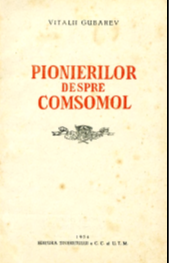

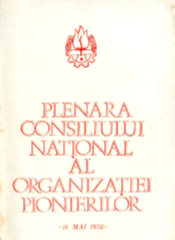
INFORMARE cu privire la modul în care se înfăptuieşte Programul de activitate ideologică al partidului de către Organizaţia Pionierilor (Information on how the program is administered by ideological activitiesw of the Party Organization oft he Pioneers) PLAN DE MĂSURI privind îmbunătăţirea activităţii politico-ideologice şi cultural-educative în rîndul pionierilor şi şcolarilor, corespunzător sarcinilor stabilite de Congresul al Xl-lea al P.C.R. (Plan of measures on improvement of political-ideological and cultural and educational activities among the pioneers and schoolchildren, appropriate tasks set by the Eleventh Congress of P.C.R.)
More...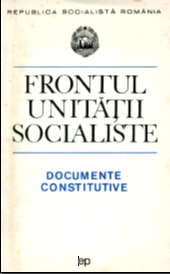
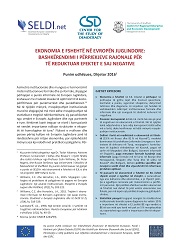
Keywords: CSD Policy Briefs; Center for the Study of Democracy; Hidden Economy; Southeast Europe
According to the authors of the policy brief, not declaring in full or partially economic activities in SEE remains widespread in virtually all areas of government – permissions and licenses, labour contracts, social security, taxes and custom duties. It signals a persistent gap between formal and informal institutions and lack of coherent enforcement of rules. Corruption pressure is higher towards those engaged in the hidden economy. At the same time their susceptibility to corruption is also higher, confirming the institutional incongruence. The immense diversity of the scale (from 19 % in Croatia to 81 % in Kosovo), prevailing patterns (no written contracts in Turkey, non-payment of health care contributions in Kosovo, envelope wages in FYR of Macedonia and Bulgaria, non-formalised business in Albania), formal vs informal wage average (higher formal wages in Bosnia and Herzegovina, Albania and Turkey and lower in Kosovo and Bulgaria) requires country specific tailor-made policies and sequencing of reforms.
More...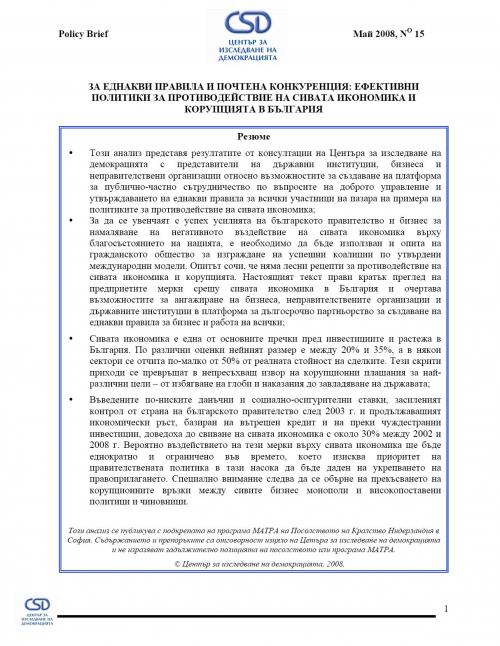
This policy brief outlines the result of the consultations, which the Center for the Study of Democracy held with representatives of business and government on the feasibility of public-private partnerships in promoting a level paying field in Bulgaria. Its findings seek to inform further discussions with Bulgarian and international stakeholders on the modalities of possible future initiatives in this area on the example of public policy on the grey economy. If the efforts of the Bulgarian government and the business community to reduce the adverse impact of grey economy on the nation’s welfare are to succeed they need to bring on board the experience from successful coalition building for good governance from the non-government sector, based on best international practices. International experience has revealed that there are no easy fixes to pervasive grey economy and corruption. This brief proposes an overview of measures undertaken thus far to tackle the grey economy in Bulgaria and outlines a possible platform for engagement of the business, NGO and government sectors for long-term partnership for leveling the paying field in the country.
More...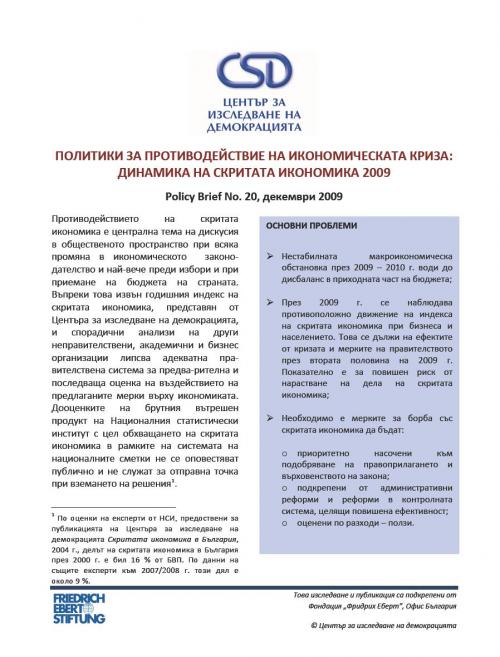
The policy brief focuses on the impact of the governemnt measures put forward to counter the economic crisis and their effect on the hidden economy. The hidden economy has been a central topic for discussion in the public space upon each amendment to the economic legislation and particularly before elections or the passing of the national budget. Nevertheless, aside from the Annual Hidden Economy Index released by the Center for the Study of Democracy and a few sporadic analyses by other non-governmental, academic and business organizations, there is a lack of an adequate government system of ex ante and ex post impact assessment of the proposed measures to fight hidden activities of the wider economy. The adjustments of GDP done by the National Statistical Institute aiming to include hidden economy in the system of national accounts are not made public and do not serve as a basis for decision-making. Thus, public debates on hidden economy become little more than displays of rhetorical skills or actually serve completely different agendas rather than the implementation of measures to curb its negative impact.
More...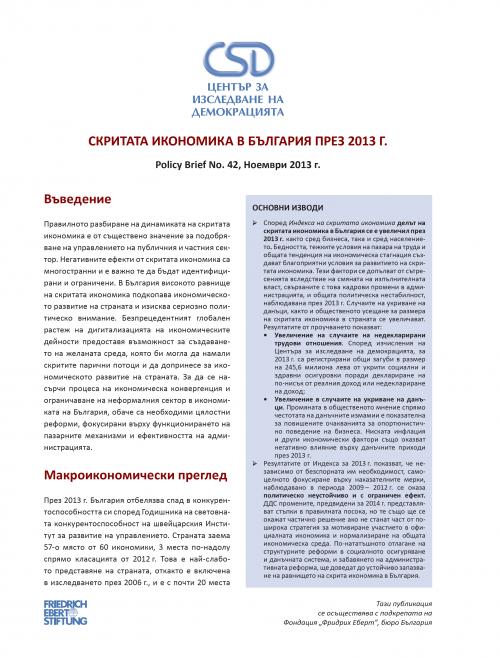
Accurate understanding of the dynamics of the hidden economy is essential for improving public and private sector management. In the case of Bulgaria, the high level of hidden economic activities signals many deficiencies in the functioning of the public institutions and the rule of law, and undermines the economic development of the country. Limiting the grey economy ought to be an issue of imminent priority for policy makers. The recent unparalleled global growth of digitalization of economic activities provides ample opportunities to reduce hidden cash flows and directly contribute to positive economic development of the country. Comprehensive, sustained reforms focusing on improvements in market and administrative efficiency are needed to facilitate the process of economic convergence and limit the negative effects of the hidden economy in Bulgaria.
More...
Keywords: Yugoslavia; army; Serbia; regime; Slobodan Milošević; war-time; peace-time; "serbization"; nationalities; transformation; police forces; international dimension; paramilitary groups;
Even if one were to maintain that some psychological, political and professional features of Yugoslav Army resembled those of the armies of some European states undergoing transition, then one must also admit that the Yugoslav Army does not have its counterpart anywhere in the world when it comes to the YA origins, background, war experience and the current political engagement. One could say without any exaggeration that it is a phenomenon among the armies of the world, as much as the Federal Republic of Yugoslavia is a phenomenon among other countries in the world. At least this assertion applies to the state and its army during the rule of Slobodan Milošević. It was created not through transformation, as the versions of the domestic (both active and retired) military professionals imply (see, for example, Veljko Kadijević, My perception of the war, Beograd 1993 page 113) but by simple downsizing and (mere renaming) of the former Yugoslav People's Army to the Serbian-Montenegrin combat and high officers cadres. That process evolved in a frightening wanton war destruction and wandering “of the armed force of all our peoples and nationalities” from Karavanka mountains in Slovenia to Danube and Drina. The Army of Yugoslavia after ten years of its existence is still searching for its own identity.
More...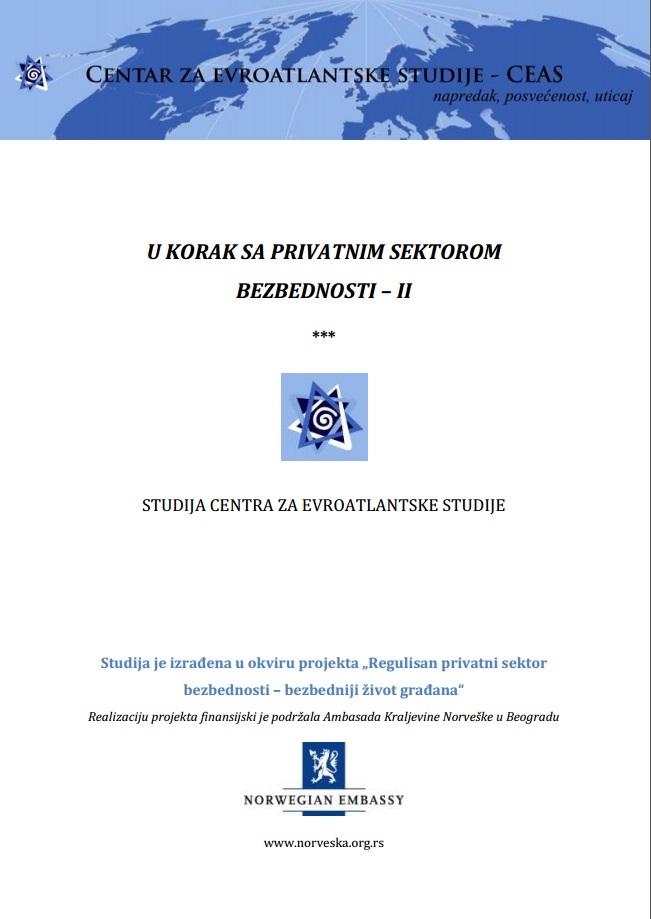
Studija U korak sa privatnim sektorom bezbednosti – II, deo je nastavka projekta „Regulisan privatni sektor bezbednosti – bezbedniji život građana“ koji Centar za evroatlantske studije iz Beograda (CEAS) sproveo uz podršku ambasade Kraljevine Norveške u Beogradu.Cilj ovog projekta, koji je realizovan u saradnji sa Udruženjem za privatno obezbeđenje Privredne komore Srbije, je vršenje javnog pritiska na predstavnike vlasti da razmatranje stanja u ovoj važnoj i velikoj privredno-bezbednosnoj oblasti, kao i njeno pravno regulisanje, uvrste među svoje prioritete, svim raspoloživim metodama javnog zagovaranja i to: kroz objavljivanje istraživanja; organizaciju javnih debata; razgovore sa predstavnicima predlagača zakona i regulativa; razgovore sa narodnim poslanicima; konsultacije sa ekspertima; konsultacije sa predstavnicima strukovnih udruženja; konsultacije sa predstavnicima civilnog društva i putem medijskih nastupa.Studija U korak sa privatnim sektorom bezbednosti – II sadrži dve analize: Obuka i licenciranje u privatnom obezbeđenju i Nespojive delatnosti pripadnika MUPa sa poslovima privatnog obezbeđenja. Prva se fokusira pre svega na proces i pravna rešenja koja uređuju obuku i licenciranje u privatnom obezbeđenju, ali i na sve do sada usvojene podzakonske akte i daje pregled zaključaka i preporuka. Druga analiza bavi se pitanjem nespojivih delatnosti policijskih službenika u odnosu na delatnost privatnog obezbeđenja. Analizira normativni okvir u kom je ovo pitanje uređeno, daje pregled zaključaka i preporuka.
More...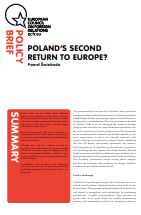
Keywords: Weimar Triangle; Donald Tusk;
Donald Tusk, the new Polish Prime Minister, wants to bring Poland back to the heart of Europe, rebuilding ties with Germany and France to create a ‘Weimar Triangle’, lessening tensions with Russia, and trying to make the country a genuine player in European foreign policy. The new Government will try to rebalance ist relationship with the United States, slowing down the move towards missile defence and withdrawing its troops from Iraq. Although there will be a change of style on contentious issues like Russia, the new government will still be an ‘assertive partner’ opting out of the Charter of Fundamental Rights; unlikely to join the euro; and likely to put up a fi ght against reform of the EU budget.Co-habitation with President Lech Kaczyński will create tensions but the government has the constitutional powers and the moral clout to set the agenda.
More...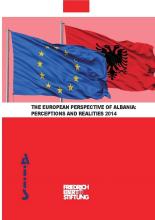
Keywords: European Integration; EU Commission; International Partnership; Regional Partnership
The Albanian Institute for International Studies (AIIS) has been measuring the pulse of public opinion in Albania regarding European integration since 2003. Through its yearly edition of the national public opinion poll “The European perspective of Albania: Perceptions and Realities” that identifies and interprets the perceptions, evaluations and thoughts of Albanian citizens (selected to make up a fairly representative sample), AIIS has been of assistance with its recommendations stemming from the study to a variety of relevant actors in both Tirana and Brussels. European institutions, their representatives in Albania, Albanian and regional media and actors in government, academia and civil society alike have benefitted from this knowledge and this insight provided every year fitted with comparisons and alerts on emerging trends.
More...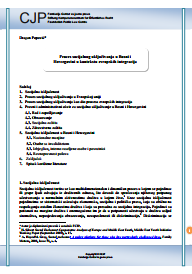
Keywords: Public law; social exclusion; social inclusion; EU accession; BiH; ethnic minorities; disabled people; refugees; gender equality; work; employment; social protection; health insurance; human rights;
Social inclusion is a process which ensures that persons, who fall into risk group and who are in threat of poverty and social exclusion, are given an opportunity and necessary resources in order to fully participate in economic, social and cultural life, and also the opportunity to enjoy a standard of living and prosperity, which is considered normal in a society in which they live. By social inclusion is ensured that an individual is fully involved in decision making processes directly related to his/her life and access to basic economic, social and political rights. The process of joining the EU provides a basis for strengthening social inclusion in Bosnia and Herzegovina, due to the needs to implement European standards in the context of social exclusion, as well as policies for its reduction. In order to join the European Union, Bosnia and Herzegovina must build capacity to address problem of social exclusion, and fulfill the preconditions relating to the social dimension of the European Union. Therefore, the issue of social inclusion is one of the main issues of development in Bosnia and Herzegovina, because it is important that Bosnia and Herzegovina provide better future to it’s citizens.
More...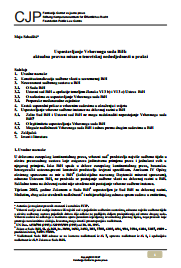
Keywords: Public law; constitution; Constitutional court; Supreme Court; establishment; BiH; legislation; thought; theoretical inconsistency; practices;
Uniform application of law with respect to all citizens of Bosnia and Herzegovina may be ensured only throughout legal unity and equality before the law. This is conceivable solely as long as if integral and hierarchical legal system with the Supreme Court at the top exists. Unity of the state is always discussed through legal unity and rule of law. As a matter of fact, the Supreme Court is ensuring uniform application and interpretation of law; equality of citizens before the law; and individual interests of citizens. Without the Supreme Court, legal certainty, equality before the law and uniform application of law for all citizens of Bosnia and Herzegovina is compromised through differences in interpretation and application of substantive and procedural law before all courts in Bosnia and Herzegovina. Establishing the Supreme Court in Bosnia and Herzegovina would correspond to effective and rational fashion of legal acts harmonization e.g. final decision-making related to interpretation and application of substantive and procedural law before all courts in Bosnia and Herzegovina irrespective of establishing mechanism and aspect towards other courts.
More...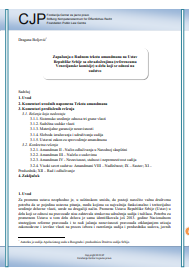
Keywords: Serbia; Constitution; changes; draft amendments; judiciary; Venice commision; observations;
The Republic of Serbia has itself committed to amending of the Constitution as far back as 2013 by adoption of the National Judicial Reform Strategy, subsequently by adoption of the Action Plan for Chapter 23 on 23 April 2016 for the purpose of strengthening the independence of the judiciary. The Ministry of Justice has, mid 2017, initiated an informal consultative process, while not offering an official stance of the State regarding the future Constitutional solutions, and on 22 January 2018 published the Working Version of the Draft Amendments to the Constitution. The process itself was led with absence of a proper debate or even dealing with the topic of strengthening of the judiciary which was the reason for change of the Constitution, and included scorn, even threats to the participants, as well as to judges and public prosecutors in general, for which reason many associations decided not to participate in the verbal debate any longer. At a first glance, the proposed solutions correspond to the suggestions from the 2007 Opinion of the Venice Commission regarding the Constitution of the Republic of Serbia and recommendations of the European Union introduced into the Action Plan for the Chapter 23: the so-called probationary appointment of judges to a three-year mandate in the National Assembly is abolished, conditions for termination of office of a judge is raised to the Constitutional level, the High Judicial Council is entrusted with selection and termination of office of all judges and presidents of courts while from its composition, at least formally, the Minister of Justice and president of the Committee of the National Assembly for the Judiciary are removed. Working Version of the Amendments does not mention any of the numerous Opinions the Venice Commission gave regarding the legal acts of Serbia; it does not contain any or it does not contain adequate explanation; those provided however do not make reference to any international standards, but only to one of Venice Commissions’ reports from 2007, and to individual, taken out of context, parts of Opinions regarding legal acts of Armenia, Georgia, Albania, Montenegro, which do not contain general positions but are related to specific proposals of solutions in special socio-historical situations of particular countries with different legal traditions; from the provided reasons, one cannot see why a specific solution was proposed, out of many possibilities, and whether it is the most optimal solution for organization of the judiciary in the Republic of Serbia. In terms of content, the Ministry of Justice has neglected the Legal Analysis of the Constitutional frame in the Republic of Serbia from 2014, which has been accepted by the whole of the judiciary, and proposed contrary solutions instead. The Judicial power remains undefined and systemically unarranged, material guarantees of the independence of the judiciary are still lacking, as are the right of judges to professional gathering and their freedom of expression of opinion. The Amendments relocate the influence of the legislative and executive to the Judicial Academy (which by means of selection of attendees in fact substantially selects judges) and to the ruling political majority since they undermine the High Judicial Council and turn it into an instrument of the parliamentary majority, which is set to decide on all matters that are the most important for the judiciary. The current constitutional guarantees of the independence of the judiciary (by omitting the current prohibition of any political influence on judge in performing the judicial function, by providing the Minister with the authority to commence a disciplinary proceeding and a procedure of dismissal of a judge, and by introduction of judicial practice as a source of law), immovability of a judges (by allowing movability of a judge irrespective of their will in any situation of “reorganization of the judicial system”) are all being diminished while incompatibility of the judicial function with other functions or jobs is defined broadly and imprecisely (incompatibility with a “private” function will allow for prohibition of professional gathering of judges). All in all, the proposed solutions do not remove, but increase the scope for political influence to the judiciary.
More...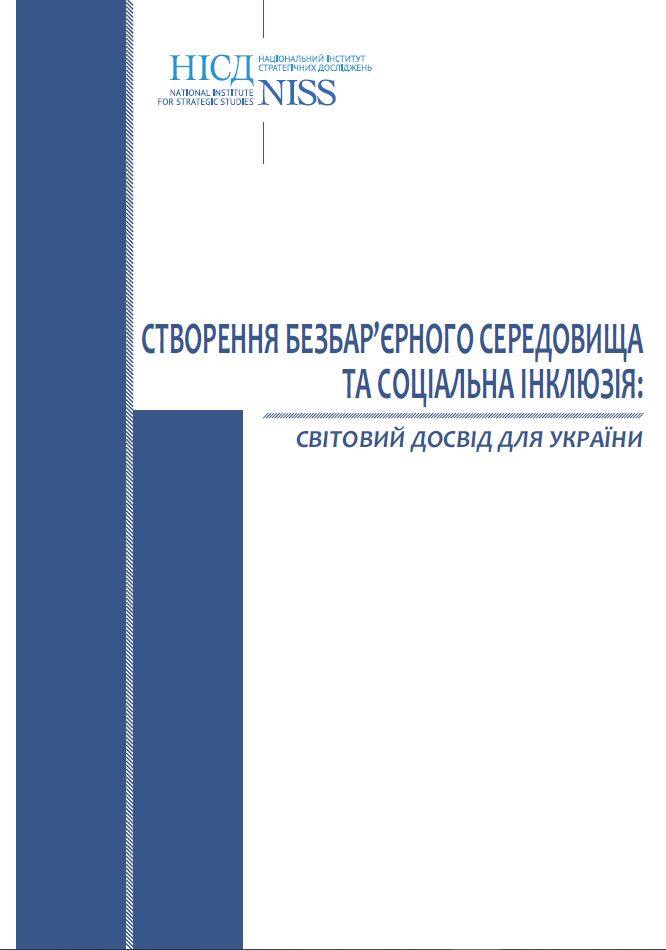
Keywords: social inclusion; barrier-free access;
Current national practices on barrier-free and social inclusion in some foreign countries are discussed. A brief description of the relevant program documents is given, their general methodology, interrelation with European and international acts are outlined. An overview of some measures in the areas of social, economic, civic, physical and digital accessibility, as well as universal infrastructure design, which can be tested in Ukraine.
More...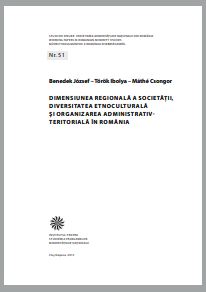
Keywords: Ethnocultural Diversity; Administrative-Territorial Organization; Romania; Economic homogenity; transport;
Public debates on the regional dimension of societal organization are plagued by a series of stereotypes originating in the lack of adequate knowledge about this phenomenon. Precisely because of this, the aim of this study is to present in a systematic and analytic manner the theoretical concepts, working methods and their possibilities of application in solving some technical aspects related to the efficient management of territory and the related issue of great actual relevance in Romania, the organization of development regions. We do not intend to elaborate an optimal solution to the problem, as we believe that no such recipe exists; conversely, we wish to contribute to the debate by sketching a number of scientifically grounded alternative proposals, the effective realization of which depends on the actual political context. While the material may seem too technical and difficult to digest without a solid background in the field, the specialized language was needed in order to meet certain requirements of scientific analysis.
More...
Keywords: E.P. Thompson; book review; railroad; Šamac-Sarajevo;
Prikaz knjige E.P. Thompsona „Pruga. Avantura izgradnje“ iz 1948, u prevodu Slobodanke Glišić, koja sadrži svedočenja članova britanske radne brigade koja je gradila prugu Šamac-Sarajevo. Tekst je objavljen u zborniku radova o ovoj knjizi, pod naslovom „Duh pruge“. Knjigu i zbornik je u jednim koricama 2020. objavila Fabrika knjiga.
More...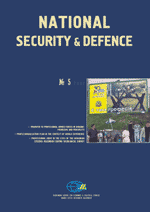
SOME ASPECTS OF PROFESSIONALISATION OF THE ARMED FORCES OF UKRAINE // TRANSITION TO PROFESSIONAL ARMED FORCES IN UKRAINE: THE PROBLEMS AND PROSPECTS // 1. FACTORS PROMPTING TRANSITION OF THE ARMED FORCES TO MANNING ON A VOLUNTEER BASIS AND PROMOTING IMPLEMENTATION OF THE PLANS OF TRANSISION // 2. FACTORS HINDERING TRANSITION OF THE ARMED FORCES OF UKPAINE TO MANNING ON A VOLUNTEER BASIS // 3. CONCLUSIONS AND PROPOSALS // A PROFESSIONAL ARMY IN UKRAINE: THE VIEWS AND ASSESSMENTS OF THE POPULATION // POSITIONS OF DOMESTIC EXPERTS // PROFESSIONAL ARMY NEEDS AN ADEQUATE FINANCING “PEOPLE'S ARMY” IS A FICTION // THE DEFENCE OF THE COUNTRY — FOR PROFESSONALS ONLY // CHANGES IN THE PROGRAMME OF COMBAT TRAINING OF THE LAND FORCES // A PROFESSIONAL ARMY REQUIRES A NEW HUMAN RESOURCES STRATEGY // ON THE PATH TOWARDS PROFESTONAL ARMED FORCES OF UKRANE // TRANSITION TO PROFESSIONAL ARMY REQUIRES A REFORMING OF RESERVE TRAINING SYSTEM // THE STATE OF FUNDING OF THE ARMED FORCES OF UKRAINE // PROFESSIONALISM OF THE ARMED FORCES OF UKRAINE: THE LEGAL ASPECT // PROFESSIONALISM OF THE ARMY: THE MYTHS AND REALITIES // POSITIONS OF FOREIGN EXPERTS // SOUTH AFRICA'S EXPERIENCE IN PROFESSIONALISATION OF THE ARMED FORCES // THE MILITARY VOLUNTARY SERVICE IN THE ARGENTINE ARMY // RESHAPING EUROPEAN ARMED FORCES FOR THE 21st CENTURY // SCENARIOS OF RUSSIAN ARMY TRANSITION TO PROFESSIONAL BASIS // PROFESSIONAL ARMY OF THE REPUBLIC OF BELARUS: “FOR” AND “AGAINST” // THE ALL-VOLUNTEER FORCE IN EASTERN EUROPE: WHEN THE ARMED FORCES MEET SOCIETY // PROFESSIONALISATION: A REVISIONIST CRITIQUE // STATE PROGRAMME OF TRANSITION OF THE ARMED FORCES OF UKRAINE TO MANNING WITH CONTRACTED SERVICEMEN
More...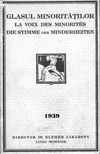
please find in the » Introduction.pdf « a complete Table of Content for all annual issues of 1939
More...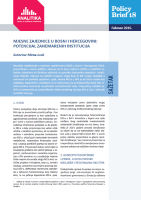
Keywords: BiH; local communities; governance; neglected institutions; evaluation;
Rezultati istraživanja o mjesnim zajednicama (MZ) u Bosni i Hercegovini (BiH), prezentirani u ovom sažetku, ukazuju na to da je njihovo učešće u različitim lokalnim pitanjima od direktne važnosti za potrebe stanovnika zajednice. Istraživanje također ukazuje na različite moguće uloge koje bi MZ mogle obavljati u zavisnosti od potreba zajednice. Ipak, većina MZ-a u BiH je de facto ostala bez zadataka, kapaciteta i sredstava, te je reducirana na predstavnička tijela bez institucionalne memorije neophodne za kontinuitet rada. Ovaj policy sažetak sadrži niz preporuka za unapređenje institucionalnog razvoja MZ-a, kao i njihovih različitih funkcija.
More...